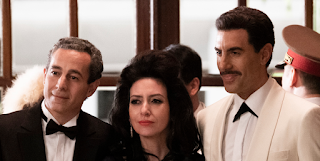
TV critic of Syrian extraction Linda Maleh was ready to be disappointed by Netflix’s news series ‘The Spy’. But she needn’t have worried – the show, which focused on the Egyptian-born Israeli spy Eli Cohen, introduced the mainstram viewing public to ‘Sephardi culture’, she writes in Alma.
A scene from the Netlix TV series ‘The Spy‘
What bothers me is that most of the world doesn’t even know that Sephardi Jews exist. They think all Jews are European. They have no idea that hundreds of thousands of Jews used to live in countries across the Middle East, and were forced to flee due to intense persecution by these countries following the establishment of the State of Israel. They don’t know we exist, and so they are certainly not making movies and TV shows about us.
Except for The Spy. One of the first things we learn about Eli when the Mossad agents are reading his file is that he had to smuggle his family out of Egypt because things had gotten so bad for Jews there, and after he did, he stayed for years to help smuggle other Jews out, too. This is a familiar story for Middle Eastern Jews. My own community in Brooklyn worked very hard to help get Jews out of Syria when it all became unbearable. (My family in particular was spared this, having immigrated to America much earlier, for the same reason Eli’s family left Syria for Egypt, which was economic hardship.) Right there from the jump, Sephardi heritage is recognized.
The first time the word “Sephardic” is used in the show is in episode 2, when Eli’s handler, Dan Peleg (Noah Emmerich in a familiar role) visits Eli’s wife, Nadia (Homeland’s Hadar Ratzon Rotem), because he feels guilty about what he’s putting them through. While he’s there, she insists that he stay and eat. “I’m a Sephardic woman,” she says. “I’m not going to let you go home unfed.” My first instinct at this was to laugh. I was raised by Sephardi women, none of whom would ever let a guest leave without trying to feed them either.
My second thought was that this was the first time I think I have ever heard the word “Sephardic” said on screen. My third was to wonder whether people watching this show, who are outside of the Jewish community, even understand what the word “Sephardic” means. Did they just sit there puzzled when she says this line in the scene? This is important, because the show is not just another Israeli show that doesn’t get far outside of the Jewish community (nothing against Israeli shows, many of them are wonderful). It is a mainstream, prestige TV series, covered by global outlets, and on the world’s main entertainment stage.
If people didn’t know that Sephardi Jews existed before, they certainly do now. Before Eli is employed by the Mossad, we get a glimpse of how he and Nadia try to navigate Israeli life as outsiders, immigrants. The people around them are mostly very white European Jews who are far more established in the young state, and Eli in particular feels out of place, wondering if the couple who employ his wife only invited them to their party to add some exotic color. Indeed, the first episode is titled “The Immigrant,” directly speaking to how out of place Eli feels in his new homeland, but also to that desire to prove himself and his worth.
My first time hearing the name Eli Cohen was not with the announcement of this show. He’s a legend in my community. So when the show dropped on Friday, almost everyone I knew was sitting down to watch it. Finally, there was a show about us. I sat tensed, waiting to see how it would portray Jews, how it would portray Israel, and how it would portray Sephardis. But I needn’t have worried. The show had done its homework on all of it, taking the subject matter seriously (even the accents are the best Israeli accents I’ve ever seen on TV — the worst is probably Cote de Pablo’s turn as Ziva on NCIS).
What’s more, the show took the extra step (which isn’t really so extra at all), and cast Jewish actors for its Jewish characters. As the end credits rolled on the last episode, I felt a great release of emotion. The show had not only lived up to the extremely high expectations I put on it, but exceeded them. For the first time, as a Sephardi Jew, I felt seen by the world.

Leave a Reply